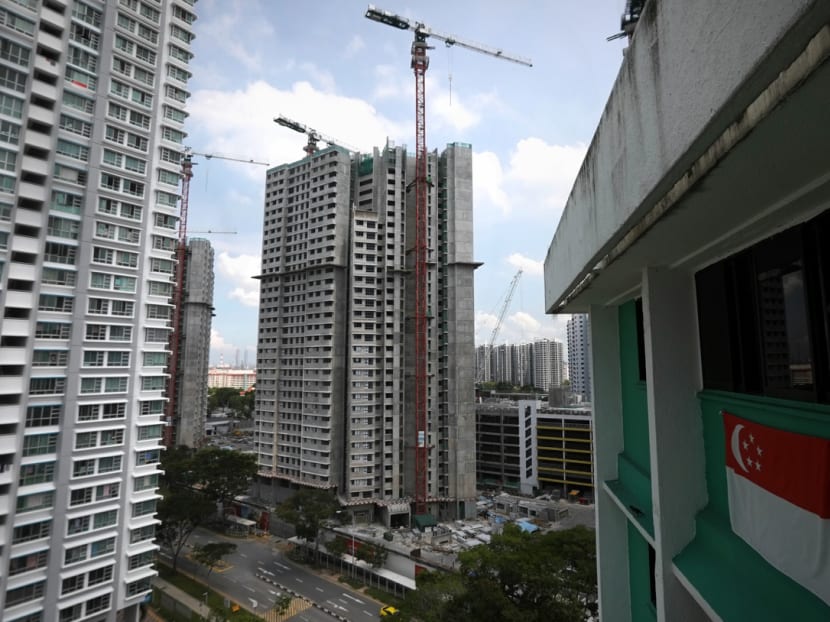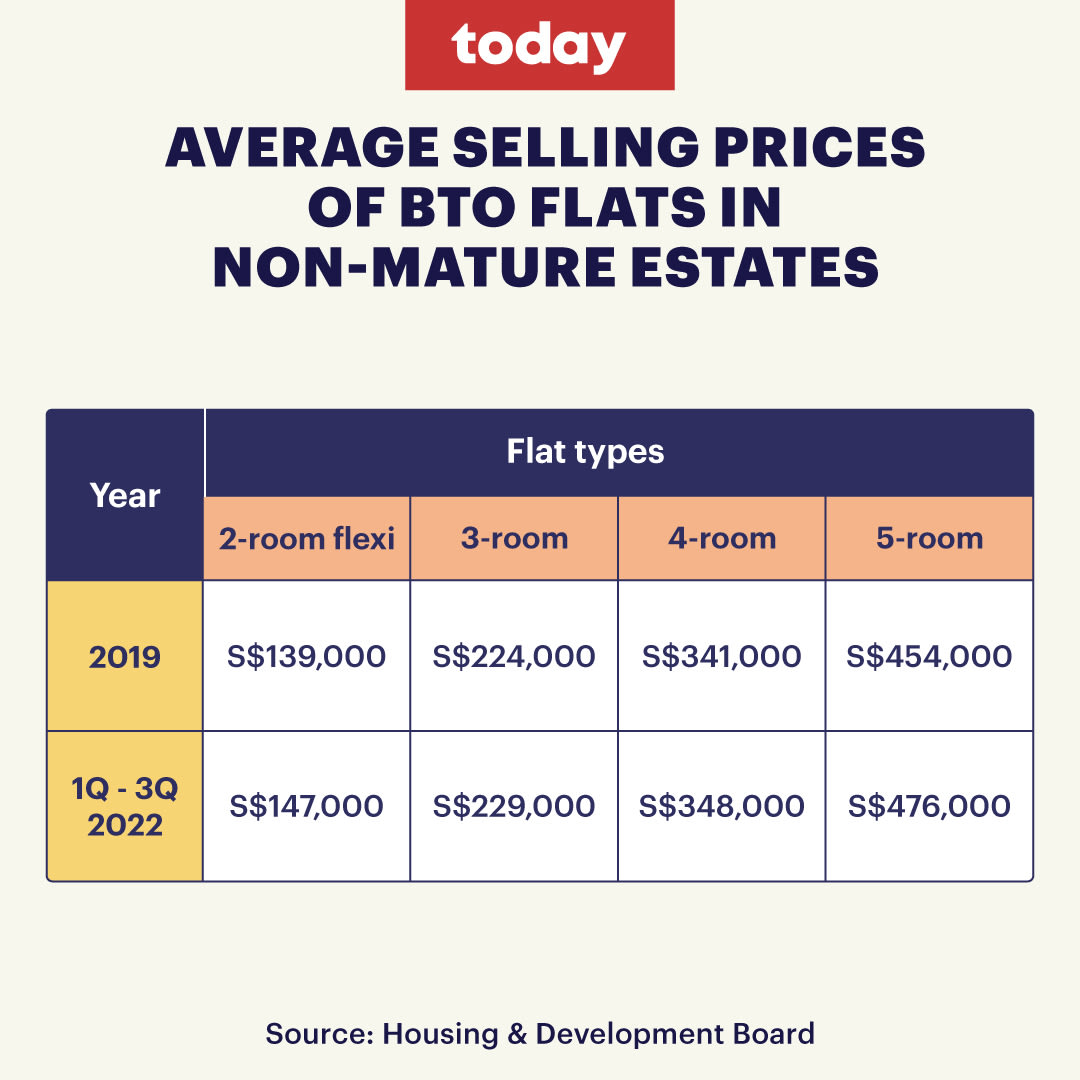BTO flats still affordable based on govt benchmarks, despite high demand and rising HDB resale prices: Desmond Lee
SINGAPORE — Despite strong demand for housing and the rising prices of Housing and Development Board (HDB) resale units, Build-To-Order (BTO) flats remain affordable, Mr Desmond Lee said.

- Build-To-Order (BTO) flats remains affordable, with affordability benchmarks remaining lower than when compared to international benchmarks
- This is despite "strong, broad-based demand for housing" over the last two years and rising prices for resale public housing flats, National Development Minister Desmond Lee said
- He was responding to parliamentary questions on how the Government is keeping housing affordable
- Mr Lee said the Government has kept BTO flat prices "relatively stable" with more subsidies
SINGAPORE — Despite strong demand for housing and the rising prices of Housing and Development Board (HDB) resale units, Build-To-Order (BTO) flats remain affordable, Mr Desmond Lee said.
Speaking in Parliament on Tuesday (Oct 4), the Minister for National Development noted that affordability benchmarks such as home price-to-income ratios and the proportion of monthly income that buyers use to service mortgage instalment payments remain lower compared to international benchmarks.
Mr Lee was responding to a question by Mr Yip Hon Weng, Member of Parliament for Yio Chu Kang, on what measures are being taken to address "a growing sentiment" that Singapore property market is unaffordable for the masses.
Mr Yip also asked what the Government is doing to ensure housing remains affordable for Singaporeans if housing market conditions do not improve.
Mr Lee said that there has been "strong, broad-based demand for housing, including in the HDB resale market" over the last two years, due to factors such as a trend towards smaller households as well as many in their 30s getting married after the easing of Covid-19 disease control measures.
"These demand factors, alongside the previous low interest rate environment that made it cheaper to service a home loan, have put upward pressure on HDB resale flat prices," Mr Lee added.
For instance, the HDB Resale Price Index has risen by 5.3 per cent in the first half of this year.
"We understand the concerns about housing affordability, and have therefore been carefully monitoring the housing market," Mr Lee said, as he stressed that the Government is committed to keeping public housing affordable and accessible.
"That is why we continue to build and sell new HDB flats at prices below the market because they come with significant subsidies."
For instance, the average price for a new four-room flat in a non-mature estate has remained "relatively stable" at S$341,000 in 2019 and S$348,000 in the first three quarters of 2022 because market subsidies have increased to keep flats affordable, he added.
Eligible first-time buyers can also receive enhanced Central Provident Fund (CPF) housing grants of up to S$80,000, with more help for lower-income buyers.
In response to queries from TODAY, HDB said the average price for a five-room BTO flat in a non-mature estate in 2019 stood at S$454,000, and this rose to S$476,000 in the first three quarters of 2022.
“The Government will intervene and do what is necessary to ensure a stable property market, and affordable public housing for SingaporeansNational Development Minister Desmond Lee”
'HOUSING REMAINS AFFORDABLE ACROSS INCOME BRACKETS'
Mr Yip also asked Mr Lee whether affordability of HDB flats should be pegged to median household incomes or other income or wealth indicators, given that salaries within the 30th percentile and below are significantly lower compared to the median percentile on the salary scale.
Responding to this, Mr Lee said: "Our affordability benchmarks do not only consider median incomes, as we provide a wide range of BTO flats for first-time homebuyers with different housing needs and budgets."
He added that, for example, a first-time homeowner or first-timer household earning about S$5,000 — which is slightly less than the 30th percentile of resident household incomes — may buy a four-room flat in any of the three non-mature estate projects in the recent BTO exercise in August this year, in Woodlands, Jurong East and Chua Chu Kang.
"These projects come with typical prices comparable to or lower than the average price of BTO flats in non-mature estates at about S$348,000," Mr Lee said.
"After factoring in the S$45,000 in grants they would receive, they will need to use about 23 per cent of their monthly income for their housing loan, which means they will be able to service their mortgages from their monthly CPF contributions with no cash outlay."
This would work out to a home price-to-income ratio of around five for this family, which means that the price of their home is about five times their annual household income.
Mr Lee gave another example of a couple who are first-time buyers and both fresh tertiary graduates drawing a typical combined starting salary of about S$6,500.
This couple would receive S$30,000 in grants, and would need to use 18 per cent of their monthly income for their housing loan, to afford the same new four-room flats in any of the non-mature estate projects in the same August BTO exercise.
"This works out to a home price-to-income ratio of around four for this family, and they would also be able to service their mortgage fully from their CPF contributions."
He added that the ratio of the median home price to the median household income in "other comparable cities" such as London, Los Angeles and Sydney are much higher, at between eight and 15 times, while in Hong Kong, it is more than 20 times.
In response to TODAY's queries, HDB said the home price-to-income ratio has remained at around four for three-room flats, and five for the bigger four-room and five-room flats.
As for the mortgage servicing ratio, which is the proportion of monthly income used to service mortgage instalment payments, it has remained below 25 per cent for most new and resale first-timer flat buyers taking on an HDB loan, Mr Lee said.
He noted that this figure is "well below" the international benchmark of 30 to 35 per cent.
"This means that most first-time buyers can service their housing loans using their monthly CPF contributions, with little or no cash outlay."
When asked by Non-Constituency MP Leong Mun Wai about whether these affordability statistics were comparing public housing in Singapore to public housing overseas, Mr Lee said that he was making a "broad comparison" with other countries' housing.
"Each country's property market is different; in many of the cities I've described, most of them do not have public sector housing the way we do," he said. "So, these are broad comparisons."
TODAY has asked HDB whether there have been any changes to these affordability benchmarks over the past two years.

23,000 FLATS IN 2022 and 2023
Touching on Mr Yip's question on ensuring affordability in the wider Singapore property market, Mr Lee said that the Government had last week announced measures to moderate the demand in the HDB resale market, as well as measures to encourage "prudent borrowing amid the rising interest rate environment".
Private property owners will now have to wait for 15 months after selling their property before they can buy a non-subsidised HDB resale flat, while the maximum loan amount limits for housing loans will also be tightened, among other measures.
"Beyond these cooling measures, the Government also recognises that there is genuine demand from homebuyers," Mr Lee said, and this is why the supply in both public and private housing markets has been increased.
HDB has ramped up its BTO supply and is on track to launch 23,000 flats a year in 2022 and 2023, which is a 35 per cent increase from 2021.
It is prepared to launch up to 100,000 flats in total from 2021 to 2025, if needed. The supply of private housing on the confirmed list of the Government Land Sales programme has also been increased by 75 per cent from 2021 to 2022.
"The Government will intervene and do what is necessary to ensure a stable property market and affordable public housing for Singaporeans," Mr Lee said.
"We will continue to monitor the market and adjust our policies as necessary on both housing demand and supply, to ensure that prices move broadly in line with economic fundamentals."
Mr Yip asked if the Government could consider increasing property tax rates for non-owner-occupied properties, such as those bought for investment purposes, or consider higher Additional Buyer's Stamp Duty — a property tax typically levied on the second and subsequent property purchase — for those who buy more than one property in Singapore, especially for foreigners.
Mr Lee said that the Government generally does not discuss any impending or upcoming measures relating to the property market "in order not to cause people to read or misread signals".








